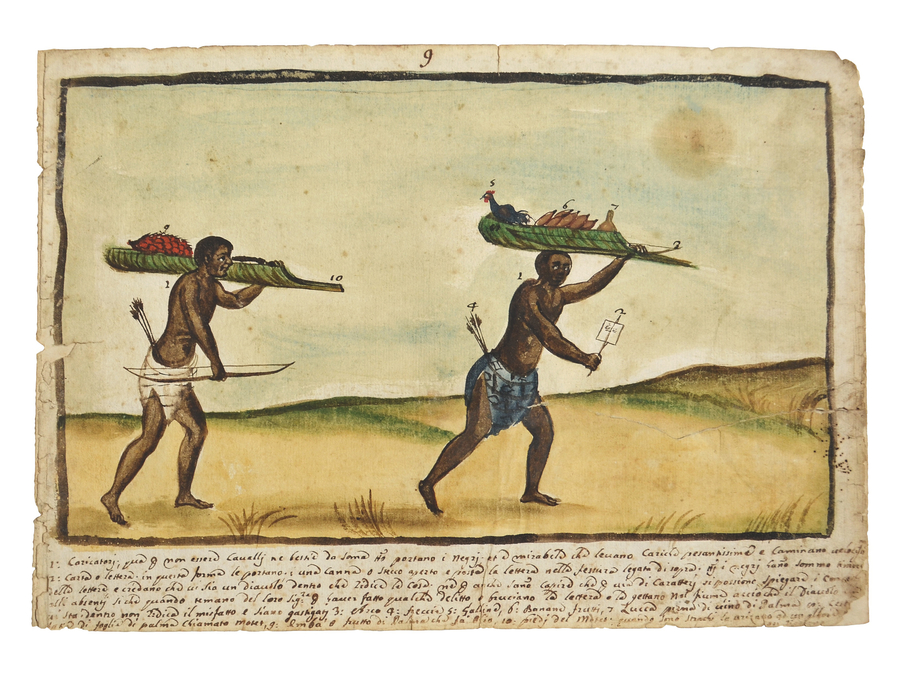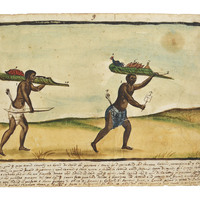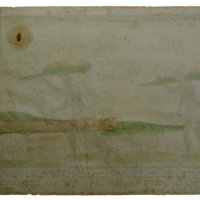PW009: Carriers
1: Caricatori; qua p[er] non essere cavalli ne bestie da soma t[u]tto portano i negri; et e mirabile che levano cariche pesantissime e caminano velocis.mo 2: carta o lettera; in questa forma le portano; una canna o stecco aperto e posta la lettera nella fessura legata di sopra; t[u]tti i negri han[n]o sommo timore delle lettere e credano che vi sia un diavolo dentro che ridice le cose; ne p[er] anche san[n]o capire che p[er] via di caratteri si possiono [sic] spiegare i Con[cetti] alli absenti si che quando temano del loro Sig:re p[er] haver fatto qualche delitto, o bruciano la lettera o la gettano nel fiume, accioche il diavolo che vi sta dentro non ridica il misfatto e siano gastigati 3: Arco 4: freccie 5 : galline, 6: Banane frutti,1 7 Zucca piena di vino di Palma 8: cesta fatta di foglie di palma chiamato motet,2 9: Emba3 o frutto di Palma che fá Olio, 10: piedi del motet: quando sono strachi le arizano ad un albore cosi ripiene
[verso, in Portuguese] negros [do?] bengo com cartas nos paus
1: carriers; here because there are neither horses nor beasts of burden, the blacks carry everything and it is remarkable that they transport very heavy loads and move very fast 2: paper or letter. They carry it in this manner, an open cane or stick and the letter placed in the split and tied above; all the blacks have greatest fear of letters and believe that there is inside a devil who repeats things, nor even can they understand that by way of characters it could be possible to explain [. . .] to those absent so that when they fear their Lord for having committed some crime they either burn the letter or throw it in the river so that the devil that is inside not repeat the misdeed and they not get punished 3: Bow 4: arrows 5: hen 6: Banana fruit 7: Gourd filled with Palm wine 8: basket made of palm leaves called motet 9: Emba or palm fruit that makes oil 10: feet of the motet when they are tired they set it up against a tree filled like this
[verso, in Portuguese] blacks with letters in wooden sticks
- 1The friars make a distinction between Niceffo and Banana in their writings, referring to two local categories of fruits from the Musaceae family. See Cavazzi and Alamandini, Istorica descrizione, 35. Pavia, Viaggio Apostolico alle Missioni dell’Africa, f. 81r. Matheus Cardoso talks about “micifos” in 1624 see Brásio, Costa, and Correia, História do Reino do Congo, 37. Pellicer de Tovar, Mission evangelica al Reyno de Congo, 53. It appears as Mizefhos with mention of the size of the leaves “big enough to shade any sized man,” the crucifix in its flesh, and its identity as the tree of the garden of Eden in a late sixteenth century anonymous manuscript, unknown, Description of the kingdom of Kongo, f. 165r. See also the unpaginated vocabulary of words from Matamba in Antonio da Gaeta and Gioia, La maravigliosa conversione. Other mentions are found in Cadornega and Delgado, História geral das guerras angolanas, 1680[-1681], 3:372. “Niceffos” and their long leaves that could cover a man (in Brazil) and the crucifix inside appear in Dionigi da Piacenza and Michel Angelo da Reggio, Viaggio, 49; Dionigi da Piacenza and Michel Angelo da Reggio, Viaggio del P. M. Angelo de Guattini da Reggio et del p. D. de Carli da Piacienza cappuccini, 64-65.
- 2From Kikongo, motete or mutete: headloads or bundles carried on the head, often in woven palm leaves baskets that also served as units of measure. See Latin entry for fascis or bundle in Vocabularium, 37. See description in Luca da Caltanisetta, Relatione del viaggio e missione di Congo fatta per me Fra Luca da Caltanisetta, missionario apostolico, olim lettore e predicatore cappuccino della provincia di Palermo nella Sicilia, nel 1689 sino al ... 1701, Biblioteca Comunale di Caltanisetta, MS 35, f. 9v.
- 3From Kikongo, Nba (pl. nba): palm tree, appears in Vocabularium. Likely Elaeis guineensis




Add new comment